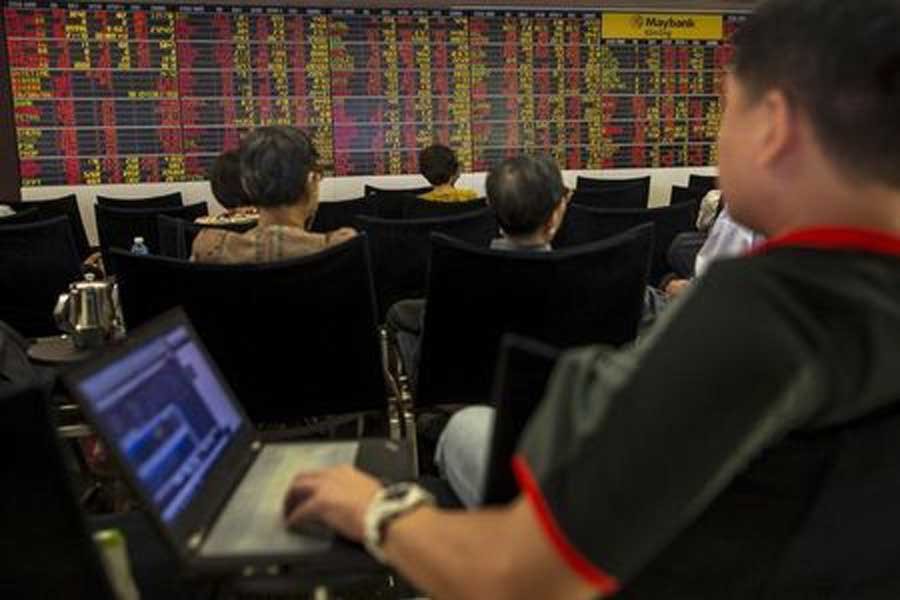Shares across most of Asia rose on Friday on expectations that the United States and China could launch a fresh round of trade talks, and as a surprisingly sharp interest rate hike in crisis-hit Turkey supported the lira and global risk appetite.
But stocks in China fell amid lingering uncertainty over the outlook for trade.
MSCI’s broadest index of Asia-Pacific shares outside Japan gained 0.8 per cent, with Australian shares up 0.6 per cent, Seoul’s Kospi gaining 1.3 per cent and Hong Kong’s Hang Seng up 0.7 per cent.
Japan’s Nikkei stock index was 1.0 per cent higher.
Those rises followed gains on Wall Street on Thursday, with the Dow Jones Industrial Average ending 0.57 per cent higher, the S&P 500 gaining 0.53 per cent and the Nasdaq Composite adding 0.75 per cent.
But Chinese shares fell, despite a short-lived bump from data that showed forecast-topping industrial output and retail sales data for August.
Other data showed real estate investment in the country fell in August, raising concerns that a cooling property market could increase risks for China’s economic outlook as the trade environment worsens.
China’s benchmark Shanghai Composite index was down 0.3 per cent and the blue-chip CSI300 index eased 0.2 per cent. Both indexes had wavered between gains and losses in the morning session.
“What the market wants is some degree of certainty,” said Jim McCafferty, head of Equity Research, Asia ex-Japan at Nomura.
“I think everyone knows that the trade deal might not be as optimistic as it might have been in ... June or July, and it might be negative for many Chinese companies. But the fact that there’s no certainty there is one reason that investors are staying on the sidelines.”
News of a possible new round of talks between Washington and Beijing comes even as the trade war between the world’s two largest economies looks set to escalate.
Chinese officials welcomed an invitation from Treasury Secretary Steven Mnuchin for new talks. But US President Donald Trump tempered market expectations, tweeting on Thursday that the US is “under no pressure to make a deal with China.”
The Trump administration is readying a final list of $200 billion in Chinese imports on which it plans to levy tariffs in the coming days, a move that many fear would mark a severe escalation in the trade war and put a significant dent in global growth.
“The news on Wednesday that US officials had invited China to restart trade talks suggests that the announcement of tariffs on $200bn of Chinese imports may be delayed. But we think the chance that fresh talks will defuse trade tensions is low,” Capital Economics analysts said in a note.
The analysts noted that Mnuchin had brokered a deal with China in May that was scuppered days later by Trump.
“As a result, he has little credibility with Chinese policymakers,” they said.
On Friday, the state-run English-language China Daily newspaper said in an editorial that China would not “surrender” to U.S. demands, and that Beijing “will not hesitate to take countermeasures against U.S. tariffs to safeguard China’s interests.”
Uncertainty around the global outlook for trade was highlighted by the European Central Bank, which on Thursday kept policy unchanged as expected and warned that risks from protectionism were gaining prominence.
‘Eye-watering’
But a sharp interest rate hike by Turkey’s central bank to support a tumbling lira boosted risk appetite in emerging markets. In a rare show of independence, the bank raised its benchmark interest rate by 625 basis points, to 24 per cent.
Currency crises both in Turkey and Argentina have stoked fears of contagion over the past several weeks, hammering emerging market assets from Indonesia to India to South Africa.
After rising as high as 6.01 to the dollar, the lira weakened slightly to 6.1275 on Friday.
“The Turkish Central Bank seems to have regained some credibility after hiking rates to an eye-watering 24 percent. This move looks to have reset investor expectations for the lira and let some investors breathe a sigh of relief,” said Hannah Anderson, Global Market Strategist, J.P. Morgan Asset Management.
“However, this is not enough to assuage all investor worries about EM. Individual emerging markets are being buffeted by highly local cross currents in the context of broader negative sentiment around EMs.”
The yield on benchmark 10-year Treasury notes rose to 2.9718 per cent compared with its US close of 2.964 per cent on Thursday.
The two-year yield, sensitive to expectations of higher Fed fund rates, touched 2.7565 per cent compared with a US close of 2.756 per cent.
The two-year yield fell on Thursday after data showed US consumer prices rose less than expected in August, and underlying inflation pressures also appeared to be slowing, suggesting the Federal Reserve’s pace of rate hikes could slow.
The euro was up 0.06 per cent at $1.1695 after rising on Thursday on comments from ECB President Mario Draghi that focused on healthy domestic fundamentals, including rapid growth in employment and a rise in wages.
The pound edged 0.1 per cent higher at $1.3118. On Thursday, the Bank of England kept interest rates on hold and highlighted greater financial market concerns about Brexit, a month after raising borrowing costs for only the second time in more than a decade.
The dollar eased 0.04 per cent against the yen to 111.87.
US crude was 0.2 per cent higher at $68.75 a barrel as Hurricane Florence approached the US east coast. Brent crude rose less than 0.1 per cent to $78.23 per barrel.
Spot gold gained 0.35 per cent $1204.96 per ounce.


